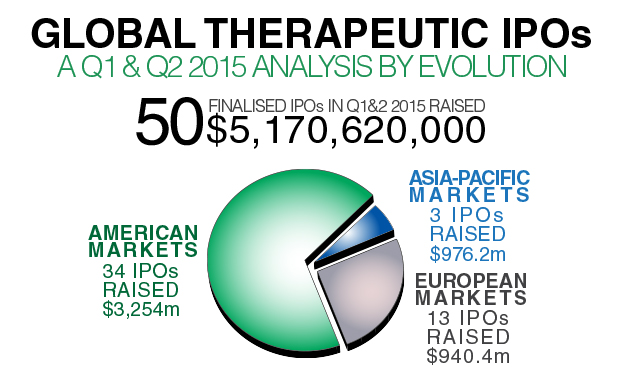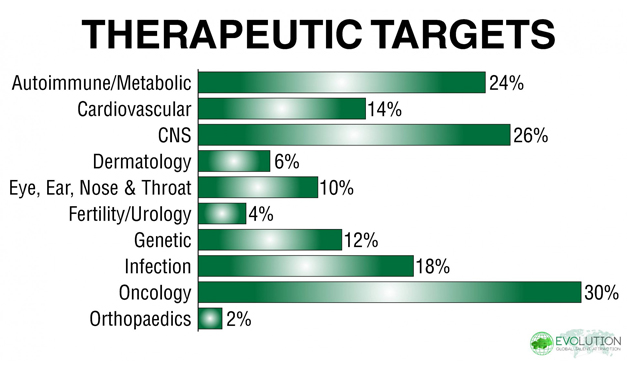
Evolution Infographic – An Analysis of 2015 Therapeutic IPOs
August 4, 2015
Evolution Announce Human Capital Partnership with Genomics Startup QuantiHealth
September 9, 2015
Evolution’s 2015 Biopharmaceutical IPO Analysis was featured in a recent article on Forbes. Science & Business correspondent Arlene Weintraub’s article, titled “Will Wall Street Volatility Dampen The Sizzling Biotech IPO Market,” utilised Evolution’s market research and analysis, as well as one of the charts from our IPO infographic.
From the article:
The record approvals have helped push biotech stocks to new highs, which no doubt is strong motivation to private companies and their venture capitalists, who are looking for rich exits via IPOs. The Nasdaq Biotechnology Index has risen 61% in the last year. Even on Friday, when the Nasdaq Composite Index lost nearly 4%, the biotech index was down only 1%.
Before examining the risk factors that could bring this party to an end, it’s worth looking at some of the trends behind the IPOs. Trend No. 1: Oncology is hot. Of the companies that went public during the first half, 30% are working on cancer drugs, according to an analysis by Evolution, a biotech analytics company in the U.K. (See chart below.) Half of the 10 companies that raised the most money on Nasdaq are working in oncology, including Cellectis ($226.2 million raised), Adaptimmune ($183.3 million) and Blueprint Medicines ($140.5 million).

The company that filed its IPO plans on Monday, Mirna, is completing Phase I testing of its immune-boosting tumor-suppressing drug, MRX34. The company will be the latest market entrant in the red-hot niche of cancer immunotherapy. That field also encompasses Cellectis and Adaptimmune, both of which are working on genetically engineered immune-based treatments called CAR-T cells—a research field that has attracted huge interest among both oncologists and investors.
Zucker notes that Wall Street’s optimism about cancer immunotherapy is step ahead of the actual advancements in that area. “At some point biotech is going to change the face of oncology and increase survival overall in a statistically meaningful way that’s going to benefit people—but it hasn’t happened yet,” he says. “The market seems to believe that many of the exciting immunotherapy companies will be the key to that revolution. But we don’t know. We won’t know for at least half a decade, potentially much longer.”
It isn’t just oncology that’s catching investors’ attention. Companies working on new therapies to treat central nervous disorders and autoimmune/metabolic diseases are also popular, representing 26% and 24% of the IPOs in the first half, according to Evolution. The top money-raiser on Nasdaq, Axovant Sciences, which brought home $308.8 million, is working on new therapies for Alzheimer’s disease.
Despite a high failure rate in diseases like Alzheimer’s, investors may be willing to take more chances on early-stage companies these days because the biotech industry has gotten better at navigating the regulatory process, Zucker surmises. “Just a few years ago, early-stage companies didn’t have regulatory strategies,” he says. “The sector has matured, and now companies think through their regulatory strategies much earlier and much more thoroughly.”
Even though that should be good for biotech companies, and by extension their investors, the industry is still facing risks that could ultimately cause the IPO window to close, Zucker warns. Many of the newly public companies are in early-stage testing of their NMEs, which means there might be very long stretches of time during which there’s no news that would indicate the probability that those compounds will ultimately succeed. “Investors tend to punish biotech for an absence of news—even when companies tell them in advance, ‘We’re not going to have news for two years,’” Zucker says. “Will the market be patient with these early-stage companies? The historical pattern is that their stock prices will drop. That should start to put the brakes on this ebullient market.”
That’s not likely to happen anytime soon, however. There’s still a lot of positive sentiment about drug development that’s driving investors’ love of biotech, Zucker notes. For one, investors are no longer worried that changes implemented under Obamacare might prompt companies to spend less on drug development, he says. Furthermore, the biotech IPO boom has left venture capitalists with plenty of capital to pour back into the sector. “Even if the public markets tank, venture money will continue to be spent,” he predicts.
Dr. Jason Beckwith, Managing Director of Evolution, commented, “Whilst we observe market optimism regarding the progress of cancer immunotherapy, we also see a strong global demand for Corporate talent throughout all bio-sectors. We are entering a paradigm shift due to increasingly efficient business models, enhanced innovation and the realisation that strong Corporate talent can reduce commercial risk, ultimately resulting in “Bio-Optimism” and leading to an increase in the frequency and value of bio-IPOs.”
Read the full article here.
Sign up for Evolution’s newsletter to keep up-to-date with our ongoing Biotechnology & Life Sciences market analysis, as well as the latest career opportunities.
Follow Evolution Global Talent Attraction on Twitter, Facebook and LinkedIN to keep up-to-date with news and trends from the biotechnology, biosciences, medical device, IT and Intellectual Property industries.


